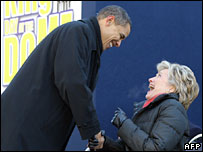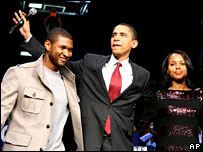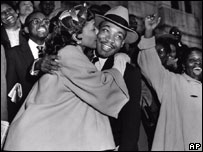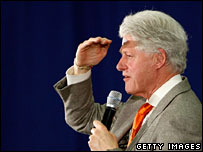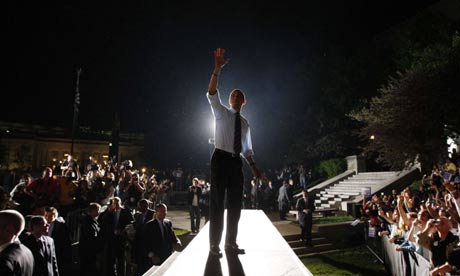Dua
JF-Expert Member
- Nov 14, 2006
- 3,229
- 662
- Thread starter
- #41
Obama and the Jews
Well what will happen next? Who will benefit from Obama being a Democrat candidate?
"No one has suffered more than the Palestinians." Was obama flip flopping? I wonder?
Ron Kampeas said:
The Canadian Jewish News January 4, 2007
Ask about Barack Obama's natural constituencies, and you might hear that he's the first black with a viable shot at the White House; or about his Kenyan father and his childhood in Indonesia; or the youthfulness of his followers; or the millions of Oprah junkies swooning over his candidacy. What you might not hear is that the Illinois senator, who made history Thursday by winning the Democratic caucus in Iowa, has made Jewish leaders an early stop at every stage in his political career.
In his first run for the Illinois Senate in 1996, he sought the backing of Alan Solow, a top Chicago lawyer. Eight years later, running for the U.S. Senate -- long before he became the shoo-in, when he was running in a Democratic field packed with a dozen candidates, including some Jews -- one of his first meetings was with Robert Schrayer,a top Jewish philanthropist in Chicago.
When he launched his campaign for the Democratic presidential nomination in late 2006, he named as his fund-raising chief Alan Solomont, the Boston Jewish philanthropist who helped shepherd Sen. John Kerry (D-Mass.) to the Democratic candidacy in 2004. And he chose a gathering of the pro-Israel lobby, the American Israel Public Affairs Committee, last March to deliver his presidential candidacy's first foreign policy speech.
"Some of my earliest and most ardent supporters came from the Jewish community in Chicago," Obama told JTA in 2004, after his keynote speech galvanized the Democratic convention in Boston. Three years later, addressing the National Jewish Democratic Council's candidate's forum, he made the same point when he was asked about his ties with Arab Americans and Muslim Americans in Chicago.
"My support within in the Jewish community has been much more significant than my support within the Muslim community," Obama said at the April forum, adding: "I welcome and seek the support of the Muslim and Arab communities." His Jewish followers are fervent, distributing "Obama '08" yarmulkes early in his campaign.
His rock-star status as well as the relationships Obama has built in the community have helped avoided murmurings about his otherwise notable divergences from pro-Israel orthodoxies. In his AIPAC speech, for example, Obama favored diplomacy as a means of confronting Iran's suspected nuclear weapons program. "While we should take no option, including military action, off the table, sustained and aggressive diplomacy combined with tough sanctions should be our primary means to prevent Iran from building nuclear weapons," he said.
AIPAC does not oppose diplomacy in engaging Iran, but dislikes it as an emphasis, believing that talks could buy the Iranian regime bomb-making time. But his words did not stop the Chicago hotel ballroom packed with 800 AIPAC members from cheering Obama on. A few weeks later, Obama drew more rubberneckers than any other candidate attending AIPAC's policy forum in Washington -- drawing away onlookers from Sen. Hillary Rodham Clinton (D-N.Y.) although she outpolls Obama among Jewish voters. No one winced when he said that Palestinian needs must be considered in working out a peace deal, although that's hardly standard AIPAC pep talk.
He made the same point at the NJDC event.
"It is in the interests of Israel to establish peace in the Middle East," he said. "It cannot be done at the price of compromising Israels security, and the United States government and an Obama presidency cannot ask Israel to take risks with respect to its security. But it can ask Israel to say that it is still possible for us to allow more than just this status quo of fear, terror, division. That cant be our long-term aspiration."
Early in his campaign, he handily killed an Israel-related controversy in its early stages. At a chat he had said that "no one has suffered more than the Palestinians." Blame the leadership was what he meant, he later explained: "What I said was, nobody has suffered more than the Palestinian people from the failure of the Palestinian leadership to recognize Israel, to renounce violence and to get serious about negotiating peace and security for the region," Obama said during an MSNBC debate.
Obama tempers his deviations from pro-Israel orthodoxy by going an extra mile in areas where he agrees with groups such as AIPAC. He has led the effort in the Senate to pass legislation that would assist U.S. states that choose to divest from Iran. His top Middle East adviser is Dennis Ross, who had the job during the Clinton administration and who has since principally blamed the Palestinian leadership for the failure of the Oslo peace process.
And in recent speeches, Obama tweaked his pro-Israel rhetoric to echo the recent drive by the Israeli government and pro-Israel groups to insist on recognition of Israel as a Jewish state.
"I think everyone knows what the basic outlines of an agreement would look like," he said in a speech redistributed by his campaign. "It would mean that the Palestinians would have to reinterpret the notion of right of return in a way that would preserve Israel as a Jewish state. It might involve compensation and other concessions from the Israelis, but ultimately Israel is not going to give up its state."
On domestic issues, Obama is savvy about Jewish social justice commitments, and is on a first name basis with two of the top Jewish religious lobbyists in Washington -- Rabbi David Saperstein of the Reform movement and Nathan Diament, who represents the Orthodox Union. But that connection is not enough to supplant Clinton among Jewish voters. In a recent American Jewish Committee poll, his favorable rating was 38 percent, while hers was 53 percent.
Clinton also has most of the Jewish congressional delegation backing her. Her years as first lady and as senator have made her a more familiar presence among Jews. Public policy groups are likelier to favor her uncompromising approach to pushing universal health care, as opposed to Obama's appeal to build consensus on the issue. Obama's appeal is in his broader vision, according to Solomont.
"This election will be about change: a change in government and the way politics is conducted," he told JTA last May. "There is a connection between gridlock and the smallness of our politics."
Well what will happen next? Who will benefit from Obama being a Democrat candidate?
"No one has suffered more than the Palestinians." Was obama flip flopping? I wonder?
